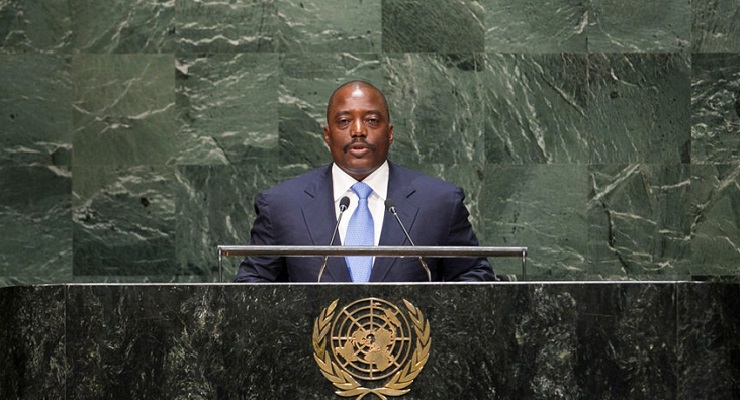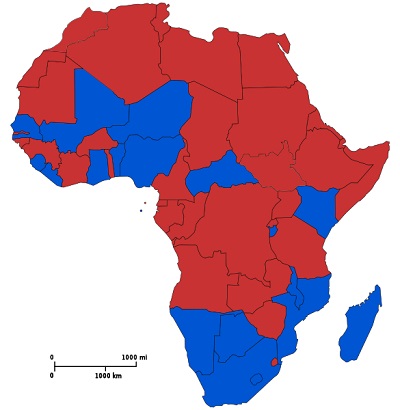
In Africa, the two-term presidential limit Africa is currently in the middle of a third term crisis. As tyrants come up against the presidential term-limits included in many multi-party constitutions, a significant number are refusing to relinquish power. Instead, a good number of leaders have sought to secure a third term with or without success. So far, this trend has taken in countries as otherwise diverse as Burkina Faso, Burundi, Namibia, Rwanda, Uganda, Djibouti and now, it seems, the Democratic Republic of Congo may go the same route.
Towards the 21st century, Presidents Sam Nujoma of Namibia, the late Fredrick Chiluba of Zambia, the late Bakili Muluzi of Malawi, and Yoweri Museveni of Uganda could not stomach the prospect of relinquishing power. While Museveni had ascended to power through a military coup in 1986 that deposed Idi Amin and Milton Obote, the other three presidents assumed power in the early 1990s, starting with Nujoma in 1990, followed by Chiluba in 1991 after defeating long time ruler Kenneth Kaunda and then Muluzi in 1994 after having defeated Hastings Kamuzu Banda in a presidential election. As per each country‘s Constitution at the time, all four presidents were obligated to stand down after a maximum of two-terms in accordance with the provisions of their respective constitutions.

link
Nujoma, Namibia‘s first president following independence in 1989, was scheduled to leave office first when his second five-year term ended in 1999, followed by Chiluba in 2001. Muluzi and Museveni were to follow in 2004 and 2005 respectively. Faced with the uncertainty of life outside the presidency, all four leaders initiated national campaigns to debate the removal of presidential term limits. In the end, the presidents of Namibia and Uganda managed to change the tenure limit provisions in their respective constitutions, which allowed Nujoma to rule until 2004 and Museveni for an unlimited term provided he is re-elected on every elections, latest elections having been held last year. However, Malawi and Zambia rejected third-term bids, forcing both Chiluba and Muluzi to step down.
Paul Biya of Cameroon successfully overturned the constitution. A two-term limit in the 1996 constitution should have prevented him from running again, but in 2008 he revised the constitution to eliminate presidential term limits. There is widespread belief that Mr. Biya, who came to power in 1982, is hoping to run again in 2018 – if the 82-year-old’s health holds up.
In Djibouti, long-time president Ismail Guelleh and his late uncle have been the only leaders since independence from France in 1977. The constitution has a two-term limit but, sadly Mr Guelleh is on his fourth, winning 87 percent of the votes in a country where democracy, rule of law and justice are foreign. Dissenting voices are thwarted and media is salvaged for any critical comment. Surprisingly, France, Japan, USA and China which all have military base turn a blind eye.
Down south, Rwanda and Burundi are not stranger to abuse of the law. In 2015, Burundi, President Pierre Nkurunzinza caused controversy with his election for a third term which left people dead and many others scurrying for cover in neighboring countries. In 2016, President Paul Kagame’s controversial third-term bid was largely peaceful with referendum giving him mandate to rule possible up to 2034 subject to re-election. Rwandans will head for presidential election on 3 and 4 August for diaspora voters and locals respectively.
Dennis Sassou N’Guesso of Congo-Brazzaville a long time ruler has no appetite of stepping down any time soon. In 2015, like Nkrunzinza hastily organized a referendum that removed presidential age limit which then was capped at 70 years.
A further crisis appears to be brewing in the Democratic Republic of Congo (DRC), where the President, Joseph Kabila, looks set to pursue an unconstitutional third term in office. DRC presidential election was due last year however, Kabila continues to hide behind financial constraints to hold a credible election. Last year, violent protests claimed several lives and injured many others in a country already in a civil war that begun in 1998. An agreement entered into with the opposition parties is said to allow Kabila to rule until December this year where an election will be held without him being a candidate. AII this is in total regard of Constitutions that was founded along the principles of democracy, the rule of law and justice for all.
About ten presidents left their office in an honorable manner and stood down at the end of their constitutionally permitted terms in office without seeking a constitutional amendment. These include Mathieu Kerekou of Benin, Mascarenhas Monteiro of Cape Verde, Jerry Rawlings of Ghana, Daniel Arap Moi of Kenya, Alpha Konaré of Mali, Joaquim Chissano and Almando Guebuza of Mozambique, Miguel Trovoada of São Tomé e Príncipe, Benjamin Mkapa and Jakaya Kikwete of Tanzania. Rawlings and Moi, veterans of their countries’ politics, were both obliged by their post-Cold War constitutions to step down after two terms in office. Despite misgivings to the contrary, both of them resigned. Late President Nelson Mandela of South Africa ruled for only one term despite his country not having a term limit. In Zimbabwe, the two-term limit is set to come into effect in 2023.
David Anderson says
Excellent piece. Pres Obama in Kenya lectured the assembled heads of state, staring at some in particular, about the importance of relinquishing power when appropriate. Didn’t do a lot of good, sadly, but there’s still room for optimism.
David
NYC
Farai says
@David, appreciated